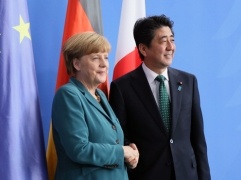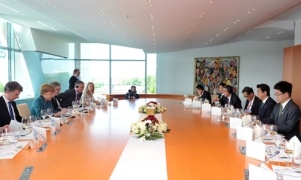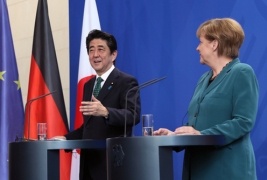Europe
Japan-The Federal Republic of Germany Summit Meeting
 (Photo: Cabinet Public Relations Office)
(Photo: Cabinet Public Relations Office)
 (Photo: Cabinet Public Relations Office)
(Photo: Cabinet Public Relations Office)
 (Photo: Cabinet Public Relations Office)
(Photo: Cabinet Public Relations Office)
 .”
.”1. Opening Remarks
(1) At the beginning of the meeting, Chancellor Merkel welcomed Prime Minister Abe’s visit to Germany, and looked forward to working with the Prime Minister to further develop the bilateral relations.
(2) Prime Minister Abe said he was pleased to be able to visit Germany, which was last visited by a Japanese Prime Minister in 2009. The Prime Minister stated that Japan and Germany share basic values and are partners that tackle global challenges, and looked forward to cooperating with Germany with both countries set to chair the G8 Summit next year and in the following year, respectively.
2. Security Policy
(1) The leaders affirmed that the security environments surrounding Japan and Europe have become increasingly severe, and that they were faced with similar challenges. Furthermore, the leaders affirmed that attempts to change the status quo by force or coercion were critical common challenge for both countries, with implications for the international order.
(2) The leaders concurred that they would strengthen cooperation in the area of security. The leaders also agreed that they would hold closer security dialogues, including the regular holding of public-private Japan-Germany security dialogues.
(3) The leaders concurred that they would continue the collaboration between the forces that both countries deploy to the coast of Somalia and in the Gulf of Aden.
3. Regional Situation
(1) Regarding the situation in Ukraine, the leaders shared the view that changes to the status quo with force can never be tolerated, and that it was not a challenge to a single region but to the international community. The leaders concurred that it was important for Japan and Germany to cooperate.
(2) Prime Minister Abe stated that stability in Ukraine required: i) improvements in the economy; ii) restoration of democracy; and iii) promotion of domestic dialogue. To realize these ends, Japan extended assistance totaling approximately US$1.5 billion, as was already announced, as well as newly ii) disbursed 300,000 euros for the emergency assistance measures of the Council of Europe aimed at restoring democracy. Furthermore, the Prime Minister stated that given the prime importance of ensuring that the presidential election is held in a transparent and fair manner with the participation of minority groups, Japan would dispatch personnel to the election observation mission for the presidential election. In addition, the Prime Minister stated that Japan has decided to iii) disburse 500,000 euros for the Special Monitoring Mission in Ukraine of the Organization for Security and Co-operation in Europe (OSCE) for promoting domestic dialogue and unification.
(3) With regard to the situation in East Asia, Prime Minister Abe stated that any attempts to alter the status quo by force or coercion cannot be accepted, and underscored that Japan and Germany must reiterate their shared belief in the respect for international order and the rule of law.
(4) Concerning the abduction issue, Prime Minister Abe requested the continued understanding and cooperation of Germany.
4. Economy and Society
(1) With Germany to chair the G8 Summit next year and Japan to chair the G8 Summit in the following year, the leaders affirmed that in the lead up to the 2015 G8 Summit, they would work closely on such matters as Security Council reform and the post-2015 development agenda.
(2) The leaders affirmed that they would advance dialogue on their common agenda, including enhancing the role of women and coping with their declining birthrates and aging populations. In addition, the leaders affirmed that they would promote cooperation for mid-tier enterprises and small and medium-sized enterprises.
(3) The leaders affirmed that they would cooperate towards the early conclusion of the Japan-EU economic partnership agreement (EPA) currently under negotiation.
5. People-to-People and Intellectual Exchanges
(1) In order to give further momentum to people-to-people and intellectual exchanges, the leaders affirmed the importance of enhancing the activities of the Japanese-German Center Berlin, vitalizing the Japan-Germany Forum, and cooperation among Japanese and German think tanks, and agreed to proactively support these activities.
(2) In the area of tourism, the leaders concurred that they would aim to increase the number of tourists to both countries, including to rural areas.

